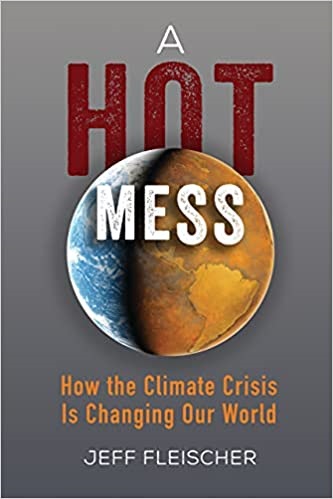A Hot Mess

Author: Jeff Fleischer
Publisher: Zest Books
We already know what climate change is and many of us understand the human causes. But what will climate change do to our world? Who will be affected (spoiler: all of us!) and how will our lives change in the future? Topics include sea levels, extreme weather, drought, animal and plant extinction, and human and animal migration. Drawing on real-life situations and stories, journalist Jeff Fleischer takes an informed, approachable look at how our world will likely change as a result of our actions, including suggestions on what we can still do to slow down these unprecedented effects.
no-repeat;left top;; autoIf if I win the lottery, I’m going to use the money to ensure that every English-speaking young person in the world receives a copy of this nonfiction book.
Why? Because despite heaps of books on climate change out there, this is one of the best – and it just happens to be targeted to young adults. (That means many an adult will appreciate the simplicity and engagement, too – will finally “get it.”)
It’s Engaging with a capital E, Readable with a capital R.
What’s a perfect climate-change book? One that smoothly toes the line between dire and chirpy, alarmist and faux-reassuring. One that takes dry science and transforms it into fascinating, clarifying stories, sidebars, graphs and photos. One that is international in scope and – despite focusing on a disconcerting topic – outstandingly easy to understand.
That would be a five-star book, one seemingly delivered not by a droll scientist, but by a popular teacher explaining matters to a rapt class. This journalist-author understands that it’s stories, not stacks of facts, that sway people. A Hot Mess is rich in stories that drive points home in a memorable fashion. All in a nonintimidating, trim 175 pages not counting the source notes, bibliography, “for further information” and index.
There’s a good chance that the tipping point of when climate change can’t be stopped … will only become obvious after the fact. Like an economic recession or the fall of an empire, it’s usually a lot easier to diagnose the point of no return once things have fallen apart than it is beforehand. Even if we pass such a point and it becomes too late to stop a specific climate outcome, we can still stop other [outcomes] and limit the damage. When a fire destroys some houses, the fire department doesn’t just give up and let it burn the others nearby. There’s value in preventing a bad outcome from becoming a worse one, and the same is true for climate change.
There’s a chance here to rise to the occasion. If young people – like many of you reading this – get educated and active, they can literally save the world.
- P.W.
no-repeat;left top;; auto
